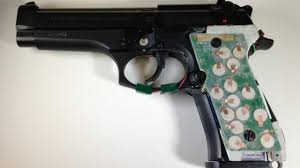The newest innovation in personalized weaponry that can only be discharged by verified users, the smart gun powered by facial recognition technology is now available for purchase from the Colorado-based Biofire Tech.
But when a prototype was presented to reporters this week, it failed to fire twice, showing the difficult and lengthy journey that smart firearms have traveled. Kai Kloepfer, the founder and CEO of the company, stated that the mechanical pistol, which was constructed using prototype and pre-production parts, was to blame for the failure. The software and electronics have also been thoroughly tested, he added.
The facial-recognition system appeared to work when the weapon shot successfully on other occasions throughout the demonstration.
One of the many smart gun capabilities available on Biofire’s weapon is a fingerprint scanner, which can prevent youngsters from accidentally killing themselves, reduce suicides, which are a major cause of gun-related deaths in the US, safeguard police from gun grabs, and render lost and stolen weapons worthless.
According to Biofire, the basic US$1,499 variant of the 9mm handgun might be accessible by the second quarter of 2024, and the first consumer-ready models could be delivered to pre-order consumers as early as this year’s fourth quarter.
Since the Armatix briefly debuted on sale in 2014, it might be the first smart pistol to be commercially sold in the US. At least two other American businesses are also working to bring a smart pistol to market: LodeStar Works and Free State Firearms.
In a demonstration at the Biofire headquarters in Broomfield, Colorado, 20-year-old Kloepfer shot a round without incident at first and then put the rifle down. The gun did not recognize the face of the next man, thus he was unable to fire.
Then Kloepfer returned and fired it once more. The gun then abruptly went click twice, although it continued to fire on successive trigger pulls. Another prototype was then introduced, and that weapon performed as intended.
Many gun aficionados are skeptical of smart gun technology because they fear it would malfunction when a weapon is immediately needed for self-defense.
In order to create a product that always unlocks for you whenever you pick it up and never unlocks when your child finds it, Kloepfer explained, “I’ve not just built a product, but an entire company around it.”

















